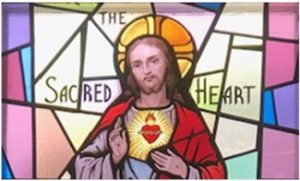Have a question about our Catholic faith that you always wanted the answer to?
On this page, our very own Deacon Doug Farwell will answer your questions. His answers to your questions will be posted here and in the weekly bulletin.
Your name will be kept anonymous, and you can submit your questions to the parish email at: [email protected]
Does SIMT Parish have protocols for the Rite of Holy Communion to the sick and homebound in place?
The answer to this question: Yes, there are protocols established through the Diocese in the Sacramental policies called “Policies for the Administration of the Sacrament” that define the requirements for the administration of the Seven Sacraments of the Church:
- The Initiation Sacraments: Baptism, Holy Communion, and Confirmation
- The Sacraments of Healing: Reconciliation and Anointing of the Sick
- And the Sacraments of Holy Matrimony and Holy Orders.
If the question is specific to the distribution of Holy Communion to the sick and homebound: There are policies in place that must be followed. First and foremost, all ministers of Holy Communion must be certified by CASE (Creating A Safe Environment), complete sexual harassment training, and have a background check accomplished through the Diocese. This includes ordinary ministers of Holy Communion–which are Bishops, Priests, and Deacons–and ‘Extra-ordinary’ Ministers of Holy Communion, which are acolytes or lay persons.
If there is a call for Extraordinary Ministers of Holy Communion, that need should be presented to the Bishop through the Chancellor by the local pastor/administrator or by the chaplain of an institution. Training for Extraordinary Ministers of Holy Communion entails at least two sessions consisting of spiritual, theological, and practical preparation. Upon completion of training, candidates complete a form about their biographical data and sign the Profession of Faith declaration in the presence of his or her pastor/administrator. These candidates are submitted by the pastor/administrator requesting these candidates be officially commissioned by the bishop. (Ref: Extraordinary Ministers of Holy Communion from Policies for the Administration of the Sacraments, Diocese of Rochester.)
Formal recognition of this ministry may be celebrated according to the rite found in the Book of Blessings. Extraordinary Ministers of Holy Communion are assigned to their own parish and normally do not exercise this ministry outside their parish. However, in certain instances (e.g., the occasion of a family wedding or funeral) when a true need exists, Extraordinary Ministers of Holy Communion may exercise their ministry at other parishes within the Diocese with the approval of the pastor/administrator.
When an extraordinary minister of Holy Communion discontinues their ministry for whatever reason, the Diocesan Chancery Office is to be notified. (Ref: Extraordinary Ministers of Holy Communion from Policies for the Administration of the Sacraments, Diocese of Rochester.)
For more information pertaining to Extraordinary Ministers of Holy Communion, visit the Diocese of Rochester website at dor.org.
What seven books are found almost exclusively
in Catholic versions of the Bible?
Those books are: Baruch, Judith, First & Second Maccabees, Tobit, Wisdom, and Sirach (Ecclesiasticus). Depending on the Catholic version of the Bible, these books may be listed separately under the category of “Deuterocanonical,” meaning a “second” or “subsequent” canon and canonized during the Council of Trent from 1545–63.
Protestant versions of the Bible contained these books until the mid-1800s and listed them as “Apocrypha,” coming from the Greek word meaning “to hide away.” The reason for the Protestant characterization is because Protestants don’t recognize these seven books as canons of scripture. Eventually, these were books dropped altogether from most Protestant versions as they were considered less important.
The deuterocanonical books were originally in the “Septuagint”–a third century B.C. Greek translation of the Old Testament, which served as the scripture of the Apostles and many generations that followed. This was in response to the Protestant Reformation when Martin Luther criticized the Catholic Church for not having scriptural support for some of its practices. The deuterocanonical books provided scriptural support for Catholic doctrines, e.g., praying for the dead.
Here are some versions of the more popular Catholic Bibles: New American Bible Revised Edition (NABRE), Revised Standard Version- Catholic Edition (RSV-CE), New Jerusalem Bible (NJB) and the Douay-Rheims Bible.
Catholic Bibles also have an “Imprimatur and a nihil obstat” found after the title page in the front of the Bible. The Imprimatur is an official approval from a clergy, usually a Bishop, that this version of the Bible is acceptable and does not contradict Church teachings. The nihil obstat is the Church certification that the book is not objectionable on moral and doctrinal grounds.
Peace, Deacon Doug
What is the Communion Antiphon,
and when is it said during the Mass?
An antiphon is a short text taken from scripture or the Psalms, but it can also be composed in a form of a prayer.
There are typically three antiphons used within the Proper of the Mass:
- Entrance Antiphon
- Offertory Antiphon, and the
- Communion Antiphon
These antiphons are used to open the celebration of Mass, promote community of those that have gathered, and introduce their thoughts to the mystery of liturgy. Antiphons are also used in the Liturgy of the Hours.
Specifically, the Communion Antiphon directs our thoughts to the mystery of the Eucharist and highlights the communal nature of the procession to receive Holy Communion.
While antiphons may be recited, they should be chanted or sung—especially the Entrance and the Communion antiphons. Probably the reason this question came up is that often antiphons are replaced with hymns, as this optional. Thus, the opening hymn would be used at the Processional; an offertory hymn at the setting of the Altar and the presentation of the gifts (bread and wine); and a communion hymn at the distribution of Holy Communion.
Conversely, whenever a hymn isn’t sung or chanted, the antiphon should be used; i.e. Entrance Antiphon to open Mass; Offertory Antiphon at the preparation of the Altar and reception of the gifts; and the Communion Antiphon said just before the priest receives Holy Communion.
Peace, Deacon Doug

